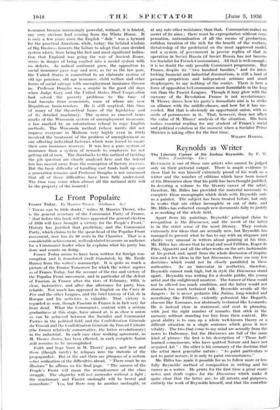Le Front Populake
France Today. By Maurice Thorez. (Gollanez. 5s.) THERE can be little doubt," writes M. Maurice Thorez, who is the general secretary of the Communist Party of France, "that before this book will have appeared the general election of 1936 will have brought a victory for the People's Front." History has justified that prediction, and the Communist Party, which claims to be the spear-head of the Popular Front movement, now has its 80 seats in the Chamber. That is a considerable achievement, well calculated to secure an audience for a Communist leader when he explains what his party has done and counts on doing.
France Today seems to have been written for foreign con- suniption and is translated (well translated, by Mr. Emile Burns) from the writer's manuscript. It is quite as much a picture of the France Tomorrow for which the writer aspires as of France Today, but the account of the rise and victory of the Popular Front movement, and in particular of the defeat of Fascism in France after the riots of February, 1934, is clear, instructive, and after due allowance for party bias, reliable. Not much has appeared in English on the Croix de Feu and the other Leagues, and the brief history of Col. de la Roeque and his activities is valuable. That victory is regarded as won, though Fascism in France is in fact very far from dead. What the Communists, content with a certain gradualness at this stage, have aimed at, is as close a union as can be achieved between the Socialist and Communist Parties in the political field, and the Confederation Generale - du Travail and the Confederation Generale du Travail Unitaire (the former relatively conservative, the latter revolutionary) in the industrial. In each case close working agreement, as M. Thorez shows, has been effected, in each complete fusion still remains to be accomplished.
Faith and hope bum in M. Thorez' pages, and here and there (though rarely) he relapses into the rhetoric of the propagandist. But at the end there are glimpses of a certain sober realisation of the difficulties ahead. 'There must be no illusions" he affirms on his final page. "The success of the People's Front will mean the recrudescence of the class struggle. The oligarchy will not surrender without a fight ; the reactionary and Fascist onslaught will be brutal and. immediate." Yes, but there may be another onslaught, or at any rate other resistance, than that. Communism makes no secret of its aims ; there must be expropriation without cora. pensation, nationalisation of all the means of production, ruthless taxation of the rich for the benefit of the workers, dictatorship of the proletariat . on the most approved model, and a system of government in precise replica of that in operation in Soviet Russia (if Soviet Russia has not become too Socialist for French Communism). All that is well enough ; it is no doubt the only possible Communist programme. But France, despite its "two hundred families," and its inter- locking financial and industrial dominations, is still a land of peasant proprietors and independent artisans and small shopkeepers, to lay nothing of the renfier. There is here a -force of opposition to'Conrununism more formidable in the long run than the Fascist Leagues. Though it may glow with the memory of the Revolution France is not reyolutionary. M. Thorez shows how his party's immediate aim:. is to strike an alliance with the middle-classes, and how far it has suc- ceeded. But that is obviously an opportunist union, with no seeds of permanence in it. That, however, does not affect the value of M. Thorez' analysis of the situation. His book makes essential reading for any student of France's social and political evolution at the moment when a Socialist Prime Minister is taking office for the first time.
WILSON HARRIS.














































 Previous page
Previous page